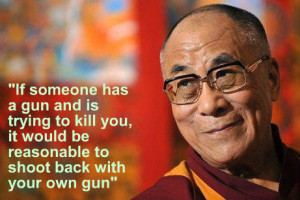A lot of people are of the opinion that everyone should have the right to protect themselves against harm. You might even think a weapon is the best way to protect yourself. Whether that’s with a knife, a gun, or just physical force, no one should be hurt or killed because they aren’t able to fight back with the necessary force.
Dr. Brown, my colleague at DRGO, really got me thinking with his recent essay on The Ethics of Armed Self-Defense.
Apparently, other people have been thinking about this too. Lamar Hankins, a self-identified progressive posted Gun Control and the Ethics of Self-Defense on The Rag Blog in January 2013. He comes to very different, idealistic conclusions while presenting himself as an objective inquirer.
The Second Amendment is a bulwark protecting our natural right of self-defense. You likely agree if, as Dr. Brown describes, you:
- value your life and those of your loved ones.
- care about the safety of your community.
- realize that one can feel a duty to defend others as well as oneself.
- recognize that you are your own first responder in any crisis.
- would not cede the right to make these decisions to others.
First, we are dealing with a natural law. Every organism defends itself.
Second, predators choose the weak. Does Mr. Hankins suggest that we abandon the weak and thin the herd?
Third, we are not a violent country by fair international comparisons. We even have a lower rate of ‘self-violence’, i.e., suicide, than some countries with more restrictive firearms laws.
Fourth, most “gun violence” occurs in large cities with segregated populations. These enclaves have been encouraged, funded and perpetuated by a single political party.
Fifth, the ATF has acted as a politicized operation for the same political party, yet has gone rogue even on that party.
Sixth, gun control laws have been unsuccessful because laws only punish after crime has been committed. Laws did not prevent the Columbine, Aurora or other school massacres, nor did they stop the San Bernardino and other terrorist attacks. Such laws only impede the ability of honest citizens to defend themselves.
Seventh, Mr. Hankins misstates the responsibilities of dedicated and honorable law enforcement officers as they relate to other citizens. All of us, in fact, by citizenship and law, have many of the same responsibilities as do LEOs. Criminals violate the honor of citizenship and the rule of law.
Is Mr. Hankins suggesting that all judges, politicians, pilots and physicians be required to undergo polygraph and psychological testing? My experience suggests that anyone can have psychopathology.
Let’s talk about “the prevalent gun violence” Mr. Hankins fears. Yes, the use and misuse of firearms. But did he actually look at the numbers?
There are different categories of violence. Five police officers have been murdered so far this year by criminals committing major crimes. Mr. Hankins’ proposals could not have changed that. Honest people defending themselves and protecting others respect the law. Criminals do not.
Where do most shootings occur? Chicago comes to mind, having had extraordinary and unconstitutional laws, but those laws did not stop criminals. How about Camden, New Jersey; Baltimore, Maryland; New Orleans, Louisiana; Los Angeles, California? They have restricted the rights of honest citizens, but criminals recognize no restraint.
Chicago has more “gun violence” that many countries. Studies have shown that if the five cities in the United States with the highest rates of gun death were excluded, we would rank fourth or fifth from the lowest on this planet.
What about suicides? Yes, there are too many in the United States. But there are countries with far more restrictive firearms laws that have much higher suicide rates. When people are so distressed that they truly want to end their lives, they will find a way.
What is the difference if the suicide is by pill, poison, rope, knife or gun? What about vehicular suicide that can also claim the lives of innocent people? The result, and the effect on society, is the same.
Declining motor vehicle death rates have been attributed to safety devices added to cars. Those can be good and useful. But recent data indicate that as fuel prices have dropped, driving has again increased and so have motor vehicle deaths. The drop in motor vehicle deaths during the recession seems to have been primarily an economic consequence.
Comparing vehicular deaths with gunshot deaths sets up a straw man argument, because they are not at all similar. Nearly all vehicular deaths are accidental; relatively few die now from gun accidents, though all deaths should be mourned and lessons learned from them.
Absolute numbers and rates of shooting deaths have dropped while honest gun ownership has soared. People are using guns more and more safely. This is true whether considering deaths per population or deaths per numbers of guns (or cars).
Most arguments for stricter gun laws are smokescreens. The causes of most violence are local. Criminals and terrorists do not follow rules. It is illegitimate, ineffective, and perhaps stupid to blame honest people for criminal violence.
The United States is a constitutional republic. Mr. Hankins and you and I all have equal rights to free speech, to be secure in our “homes and possessions”, and to “keep and bear arms”. Let’s keep it that way.
 —Robert A. Margulies, MD, MPH is an emergency medicine specialist, retired Navy Medical Corps captain, and firearm trainer with multiple certifications from the NRA and the Massad Ayoob Group.
—Robert A. Margulies, MD, MPH is an emergency medicine specialist, retired Navy Medical Corps captain, and firearm trainer with multiple certifications from the NRA and the Massad Ayoob Group.

